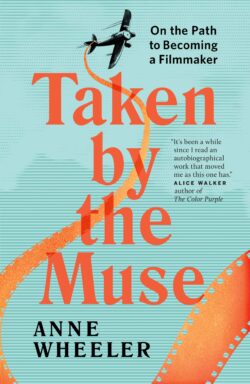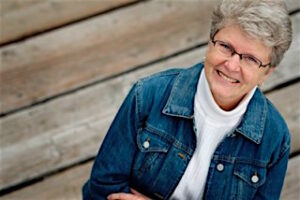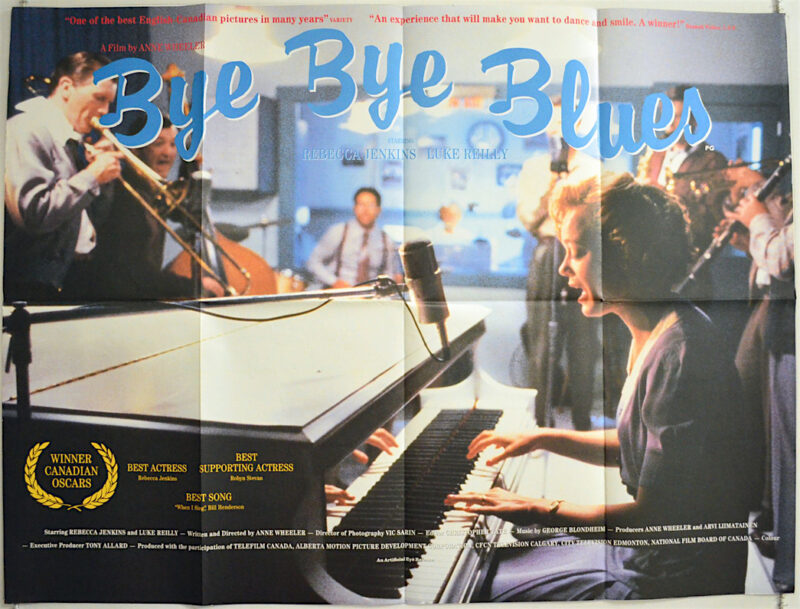1046 Featuring Anne Wheeler
Taken by the Muse: On the Path to Becoming a Filmmaker
by Anne Wheeler
Edmonton: Newest Press, 2020
$20.95 / 9781774390016
Reviewed by Lynne Bowen
*
 A train has stopped on a prairie siding. A passenger watches through the window as several children play shinny on a frozen water-filled ditch beside the tracks. It is a unique Canadian moment and writer and director Anne Wheeler captured it in the movie Bye Bye Blues (1989).
A train has stopped on a prairie siding. A passenger watches through the window as several children play shinny on a frozen water-filled ditch beside the tracks. It is a unique Canadian moment and writer and director Anne Wheeler captured it in the movie Bye Bye Blues (1989).
When I watched this moment on the screen back in the early 1990s, I realized that this was the first time I had watched a movie that was about me. I had spent my youth reading books about British history and watching movies telling American stories, but suddenly, thanks to Anne Wheeler, I was experiencing a story about me. About us. The identification was powerful and I’ve been an admirer of Anne Wheeler’s ever since. I began to read Taken by the Muse, Wheeler’s autobiographical treatment of the first decade of her remarkable career, with great anticipation.

Wheeler pulls the reader into the book with an account of a mysterious telephone conversation with Margaret Laurence. Two Canadian icons on one page. How lucky can a reader be? The encounter comes at the end of Laurence’s life and the beginning of Wheeler’s career. The revered writer tells the young would-be filmmaker “You have to discover your own truth.”
And so for the rest of this entertaining and surprising volume, the first in what we hope will be more to come, Wheeler tells us about a “series of serendipitous encounters” she had on her way to becoming a filmmaker.
A bachelor’s degree in mathematics, travel in Europe, and a year of teaching school failed to satisfy the wanderer in Wheeler. Over the rest of the 1970s she embarked on a series of adventures that she has told to friends and acquaintances but never written down until now.

The reader watches as the young woman struggles to be taken seriously by her male partners in a fledgling filmmaking company at a time when women were regarded as useful but subordinate in this industry. As the only female partner in Filmwest Associates, she battles age-old stereotypes of what a woman should do and should be able to do, as she learns everything she can about writing, producing, and financing films. She becomes familiar with the equipment by the seat of her pants as she pretends to know what she is doing.
It is not surprising that the woman who became a successful writer and director of television and screen writes engaging personal prose. We are with her as she drives alone across the plains of Africa in a small and poorly-serviced car. It is dark and the road is inhabited by the occasional elephant and more than one eighteen-wheeler with its headlights off and its driver drunk. Back in Alberta she takes us aloft on a filming expedition that requires her to hang out the door of a small plane to record the once-in-an-epoch plowing of virgin prairie in southern Alberta.

She braves an Alberta snowstorm to meet a ninety-year-old woman who came to the province seventy years before in answer to an ad placed by a stranger who was looking for a wife to look after him in a primitive shack far from civilization. By telling this story, Wheeler draws attention not only to the rich resource that exists in the memories of the elderly but to how the old woman’s situation parallels Wheeler’s struggles to be treated as an equal by her male business partners.
Whether it’s a description of a lesson in the need for gender equality while sitting on a curb in Bombay or the harrowing account of a plunge through the ice into the freezing water of a northern lake while driving a snowmobile, Wheeler’s prose reads with the intensity of an action script. Her reliance on dialogue to advance the story is very effective even as this reader, a former teacher of non-fiction writing, questions Wheeler’s ability to remember accurately what she and her characters actually said so many years before.

But Wheeler took that ability to write and remember into a career that involved telling more Canadian stories — her serialization of Laurence’s The Diviners (1993), her direction of Da Vinci’s Inquest (1998) are just two examples — and becoming a leader in the art of telling Canadians their own stories.
Taken by the Muse contains one after another of exciting and meaningful vignettes — enough to last a lifetime and yet the book covers only one decade in Wheeler’s life. We can look forward to much more from Anne Wheeler.
*

Lynne Bowen has a Masters degree in Western Canadian History and has written seven books of popular history — Boss Whistle: The Coal Miners of Vancouver Island Remember; Three Dollar Dreams; Muddling Through: The Remarkable Story of the Barr Colonists; Those Lake People: Stories of Cowichan Lake; Robert Dunsmuir: Laird of the Mines, Whoever Gives Us Bread: The Story of Italians in British Columbia and Those Island People — which have won several awards including the Lieutenant Governorʼs Medal for Writing B.C. History, the Hubert Evans Nonfiction Prize, and the F.G Bressani Literary Prize for Creative Nonfiction. She taught creative writing at UBC for fourteen years and lives in Nanaimo. Editor’s note: Lynne Bowen has also reviewed a book by Adriana A. Davies for The Ormsby Review.
*
The Ormsby Review. More Books. More Reviews. More Often.
Publisher and Editor: Richard Mackie
The Ormsby Review is a journal service for in-depth coverage of B.C. books and authors. The Advisory Board consists of Jean Barman, Wade Davis, Robin Fisher, Cole Harris, Hugh Johnston, Patricia Roy, David Stouck, Maria Tippett, and Graeme Wynn. Scholarly Patron: SFU Graduate Liberal Studies. Honorary Patron: Yosef Wosk. Provincial Government Patron since September 2018: Creative BC
“Only connect.” – E.M. Forster
